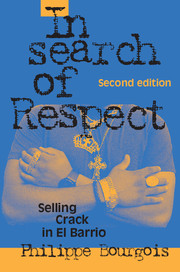Book contents
- Frontmatter
- Contents
- Acknowledgments
- Preface to the 2003 Second Edition
- Introduction
- 1 Violating Apartheid in the United States
- 2 A Street History of El Barrio
- 3 Crackhouse Management: Addiction, Discipline, and Dignity
- 4 “Goin Legit”: Disrespect and Resistance at Work
- 5 School Days: Learning to be a Better Criminal
- 6 Redrawing the Gender Line on the Street
- 7 Families and Children in Pain
- 8 Vulnerable Fathers
- 9 Conclusion
- Epilogue
- Epilogue 2003
- Notes
- Bibliography
- Index
- Other books in the series
9 - Conclusion
Published online by Cambridge University Press: 05 June 2014
- Frontmatter
- Contents
- Acknowledgments
- Preface to the 2003 Second Edition
- Introduction
- 1 Violating Apartheid in the United States
- 2 A Street History of El Barrio
- 3 Crackhouse Management: Addiction, Discipline, and Dignity
- 4 “Goin Legit”: Disrespect and Resistance at Work
- 5 School Days: Learning to be a Better Criminal
- 6 Redrawing the Gender Line on the Street
- 7 Families and Children in Pain
- 8 Vulnerable Fathers
- 9 Conclusion
- Epilogue
- Epilogue 2003
- Notes
- Bibliography
- Index
- Other books in the series
Summary
Ooh, Felipe! You make us sound like such sensitive crack dealers.
Caesar [commenting on the manuscript]There is no panacea for the suffering and self-destruction of the protagonists in these pages. Solutions to inner-city poverty and substance abuse framed in terms of public policy often appear naive or hopelessly idealistic. Given the dimensions of structural oppression in the United States, it is atheoretical to expect isolated policy initiatives, or even short-term political reforms, to remedy the plight of the poor in U.S. urban centers in the short or medium term. Racism and class segregation in the United States are shaped in too complex a mesh of political-economic structural forces, historical legacies, cultural imperatives, and individual actions to be susceptible to simple solutions.
There are also the inevitable limits of political feasibility. For a number of complicated historical and ideological reasons the United States simply lacks the political will to address poverty in any concerted manner. Nevertheless, I hope my presentation of the experience of social marginalization in El Barrio, as seen through the struggles for dignity and survival of Ray's crack dealers and their families, contributes on a concrete practical level to calling attention to the tragedy of persistent poverty and racial segregation in the urban United States. I cannot resign myself to the terrible irony that the richest industrialized nation on earth, and the greatest world power in history, confines so many of its citizens to poverty and to prison.
- Type
- Chapter
- Information
- In Search of RespectSelling Crack in El Barrio, pp. 318 - 327Publisher: Cambridge University PressPrint publication year: 2002

